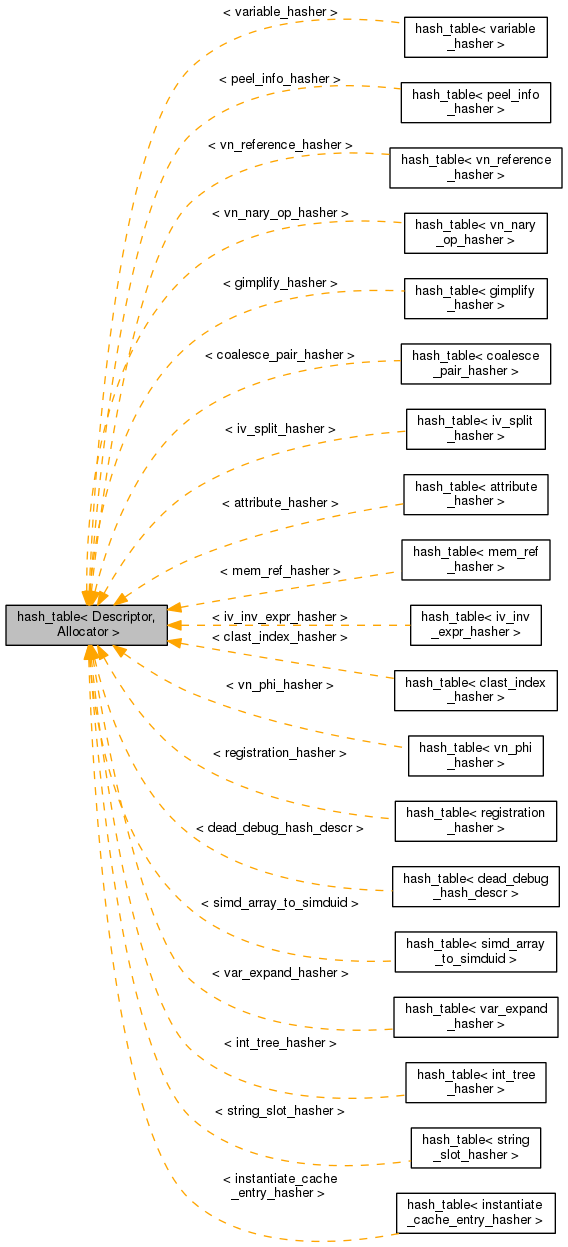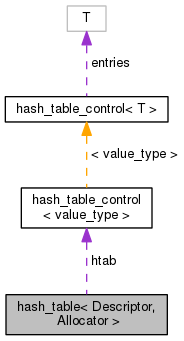#include <hash-table.h>


Data Structures | |
| class | iterator |
Public Types | |
| typedef Descriptor::value_type | value_type |
| typedef Descriptor::compare_type | compare_type |
Public Member Functions | |
| hash_table () | |
| void | create (size_t initial_slots) |
| bool | is_created () |
| void | dispose () |
| value_type * | find (const value_type *value) |
| value_type * | find_with_hash (const compare_type *comparable, hashval_t hash) |
| value_type ** | find_slot (const value_type *value, enum insert_option insert) |
| value_type ** | find_slot_with_hash (const compare_type *comparable, hashval_t hash, enum insert_option insert) |
| void | empty () |
| void | clear_slot (value_type **slot) |
| void | remove_elt (const value_type *value) |
| void | remove_elt_with_hash (const compare_type *comparable, hashval_t hash) |
| size_t | size () |
| size_t | elements () |
| size_t | elements_with_deleted () |
| double | collisions () |
| template<typename Argument , int(*)(value_type **slot, Argument argument) Callback> | |
| void | traverse_noresize (Argument argument) |
| template<typename Argument , int(*)(value_type **slot, Argument argument) Callback> | |
| void | traverse (Argument argument) |
| iterator | begin () |
| iterator | end () |
Private Member Functions | |
| value_type ** | find_empty_slot_for_expand (hashval_t hash) |
| void | expand () |
Private Attributes | |
| hash_table_control< value_type > * | htab |
Detailed Description
template<typename Descriptor, template< typename Type > class Allocator = xcallocator>
class hash_table< Descriptor, Allocator >
User-facing hash table type.
The table stores elements of type Descriptor::value_type.
It hashes values with the hash member function.
The table currently works with relatively weak hash functions.
Use typed_pointer_hash <Value> when hashing pointers instead of objects.
It compares elements with the equal member function.
Two elements with the same hash may not be equal.
Use typed_pointer_equal <Value> when hashing pointers instead of objects.
It removes elements with the remove member function.
This feature is useful for freeing memory.
Derive from typed_null_remove <Value> when not freeing objects.
Derive from typed_free_remove <Value> when doing a simple object free.
Specify the template Allocator to allocate and free memory.
The default is xcallocator. Member Typedef Documentation
| typedef Descriptor::compare_type hash_table< Descriptor, Allocator >::compare_type |
| typedef Descriptor::value_type hash_table< Descriptor, Allocator >::value_type |
Constructor & Destructor Documentation
|
inline |
Construct the hash table. The only useful operation next is create.
Member Function Documentation
|
inline |
Hash table iterator producers.
The beginning of a hash table iteration.
References hash_table< Descriptor, Allocator >::iterator::slide().
Referenced by vectorize_loops().
| void hash_table< Descriptor, Allocator >::clear_slot | ( | value_type ** | slot | ) |
This function clears a specified SLOT in a hash table. It is useful when you've already done the lookup and don't want to do it again.
References abort().
Referenced by copy_original_table_clear(), discard_useless_values(), disqualify_candidate(), emit_note_insn_var_location(), ggc_free_overhead(), ggc_prune_ptr(), haifa_htab_i1_traverse(), haifa_htab_i2_traverse(), lto_orig_address_remove(), preserve_constants_and_equivs(), remove_local_expressions_from_table(), remove_value_from_changed_variables(), and variable_was_changed().
|
inline |
Referenced by dump_hash_table(), htab_statistics(), and tail_merge_optimize().
| void hash_table< Descriptor, Allocator >::create | ( | size_t | size | ) |
Create a hash table with at least the given number of INITIAL_SLOTS.
References hash_table_higher_prime_index(), prime_ent::prime, and prime_tab.
Referenced by addr_stridxptr(), alloc_mem(), allocate_pool_descriptor(), allocate_vn_table(), analyze_insns_in_loop(), assign_filter_values(), break_out_includes(), browse_tree(), build_gimple_cfg(), build_type_inheritance_graph(), coalesce_ssa_name(), compute_ld_motion_mems(), compute_store_table(), convert_to_eh_region_ranges(), copy_bb_and_scalar_dependences(), copy_decls_for_unworthy_types(), create_coalesce_list(), create_output_block(), create_pseudo_cfg(), cselib_init(), curr_statistics_hash(), dataflow_set_merge(), dead_debug_global_insert(), debug_fold_checksum(), dse_step0(), dwarf2out_finish(), eliminate_local_variables(), execute_strength_reduction(), find_or_create_vtbl_map_node(), fold_build1_stat_loc(), fold_build2_stat_loc(), fold_build3_stat_loc(), fold_build_call_array_loc(), get_bitmap_descriptor(), get_instantiated_value_entry(), get_mem_ref_hash_table(), get_named_event_id(), get_non_trapping(), ggc_record_overhead(), gloog(), graphite_transform_loops(), gt_pch_save(), init_alias_vars(), init_allocno_hard_regs(), init_pre(), init_scc_vn(), init_ssa_renamer(), init_worklist(), initialize_original_copy_tables(), initiate_regno_cost_classes(), insert_clobber_before_stack_restore(), ipa_profile_generate_summary(), ipa_profile_read_summary(), iv_analysis_loop_init(), lookup_tmp_var(), lower_eh_constructs(), lto_reader_init(), lto_streamer_init(), make_loc_descriptor(), merge_identical_invariants(), note_simd_array_uses_cb(), optimize_external_refs(), optimize_location_lists(), optimize_macinfo_range(), parallelize_loops(), perform_var_substitution(), possible_polymorphic_call_targets(), print_fold_checksum(), print_generated_program(), record_delay_slot_pair(), register_scoped_attributes(), separate_decls_in_region(), shared_hash_unshare(), sjlj_assign_call_site_values(), sra_initialize(), thread_block(), tm_log_init(), tree_lower_complex(), tree_ssa_dominator_optimize(), tree_ssa_iv_optimize_init(), tree_ssa_uncprop(), undistribute_ops_list(), update_ssa(), var_map_base_init(), vectorize_loops(), vt_emit_notes(), and vt_initialize().
| void hash_table< Descriptor, Allocator >::dispose | ( | ) |
Dispose of a hash table. Free all memory and return this hash table to the non-created state. Naturally the hash table must already exist.
References hash_table< Descriptor, Allocator >::size().
Referenced by assign_filter_values(), break_out_includes(), browse_tree(), build_gimple_cfg(), coalesce_ssa_name(), convert_to_eh_region_ranges(), copy_bb_and_scalar_dependences(), copy_decls_for_unworthy_types(), cselib_finish(), dead_debug_global_finish(), delete_coalesce_list(), delete_points_to_sets(), delete_worklist(), destroy_output_block(), dse_step7(), dwarf2out_finish(), eliminate_local_variables(), execute_dwarf2_frame(), execute_strength_reduction(), fini_pre(), fini_ssa_renamer(), finish_allocno_hard_regs(), finish_regno_cost_classes(), free_ld_motion_mems(), free_mem(), free_mem_ref_resources(), free_opt_info(), free_original_copy_tables(), free_polymorphic_call_targets_hash(), free_scc_vn(), free_store_motion_mems(), free_var_substitution_info(), free_vn_table(), get_named_event_id(), get_non_trapping(), gloog(), graphite_transform_loops(), gt_pch_save(), insert_clobbers_for_var(), ipa_profile_generate_summary(), ipa_profile_read_summary(), iv_analysis_done(), lower_eh_constructs(), merge_identical_invariants(), one_store_motion_pass(), optimize_location_lists(), output_comdat_type_unit(), output_comp_unit(), output_macinfo(), parallelize_loops(), pop_gimplify_context(), print_fold_checksum(), separate_decls_in_region(), shared_hash_destroy(), sjlj_assign_call_site_values(), sra_deinitialize(), thread_block(), tm_log_delete(), tree_lower_complex(), tree_ssa_dominator_optimize(), tree_ssa_iv_optimize_finalize(), tree_ssa_strlen(), tree_ssa_uncprop(), undistribute_ops_list(), vectorize_loops(), vt_emit_notes(), vt_finalize(), and instantiate_cache_type::~instantiate_cache_type().
|
inline |
Return the current number of elements in this hash table.
Referenced by cselib_process_insn(), dataflow_set_different(), dataflow_set_merge(), dump_hash_table(), dump_vars(), emit_notes_for_changes(), gcse_after_reload_main(), gen_parallel_loop(), htab_statistics(), insert_phi_nodes(), num_coalesce_pairs(), optimize_macinfo_range(), reduction_phi(), separate_decls_in_region(), shared_hash_unshare(), transform_to_exit_first_loop(), try_create_reduction_list(), vt_emit_notes(), and vt_find_locations().
|
inline |
Return the current number of elements in this hash table.
Referenced by dump_ggc_loc_statistics().
| void hash_table< Descriptor, Allocator >::empty | ( | ) |
This function clears all entries in the given hash table.
References hash_table_higher_prime_index(), memset(), prime_ent::prime, prime_tab, and hash_table< Descriptor, Allocator >::size().
Referenced by clear_iv_info(), cselib_reset_table(), dse_step1(), empty_mem_ref_hash_table(), free_delay_pairs(), free_loop_data(), parallelize_loops(), and process_scc().
|
inline |
The end of a hash table iteration.
Referenced by vectorize_loops().
|
private |
The following function changes size of memory allocated for the entries and repeatedly inserts the table elements. The occupancy of the table after the call will be about 50%. Naturally the hash table must already exist. Remember also that the place of the table entries is changed. If memory allocation fails, this function will abort.
References hash_table_higher_prime_index(), prime_ent::prime, prime_tab, and hash_table< Descriptor, Allocator >::size().
|
inline |
Like find_with_hash, but compute the hash value from the element.
Referenced by adjust_simduid_builtins(), apply_opt_in_copies(), dead_debug_global_find(), find_basis_for_base_expr(), find_hard_regs(), get_bb_copy(), get_bb_original(), get_loop_copy(), outside_finally_tree(), reduction_phi(), TB_up_expr(), and vectorize_loops().
|
private |
Similar to find_slot, but without several unwanted side effects:
- Does not call equal when it finds an existing entry.
- Does not change the count of elements/searches/collisions in the
hash table.
This function also assumes there are no deleted entries in the table.
HASH is the hash value for the element to be inserted.
References abort(), hash_table_mod1(), and hash_table_mod2().
|
inline |
Like find_slot_with_hash, but compute the hash value from the element.
Referenced by account_time_size(), add_action_record(), add_ehspec_entry(), add_or_mark_expr(), alloc_expression_id(), analyze_insns_in_loop(), build_new_reduction(), canon_file_name(), clast_name_to_index(), clast_name_to_lb_ub(), clast_name_to_level(), coalesce_ssa_name(), copy_original_table_clear(), copy_original_table_set(), dead_debug_global_insert(), dwarf2out_finish(), find_or_create_vtbl_map_node(), find_pbb_via_hash(), find_rtx_in_ldst(), fold_checksum_tree(), get_expr_id(), get_group_info(), get_named_event_id(), get_rename(), insert_clobber_before_stack_restore(), insert_hard_regs(), lookup_expression_id(), lookup_external_ref(), lookup_or_add_counter(), lookup_redirection_data(), lookup_tmp_var(), lto_orig_address_get(), lto_orig_address_map(), lto_orig_address_remove(), make_loc_descriptor(), mark_bb_with_pbb(), note_simd_array_uses_cb(), optimize_macinfo_range(), possible_polymorphic_call_targets(), record_equiv(), record_in_finally_tree(), record_potential_basis(), remove_equivalence(), save_clast_name_index(), set_rename(), setup_regno_cost_classes_by_aclass(), setup_regno_cost_classes_by_mode(), store_child_info(), streamer_string_index(), thread_private_new_memory(), tm_log_add(), tm_log_emit_restores(), tm_log_emit_saves(), uncprop_into_successor_phis(), undistribute_ops_list(), update_mem_ref_hash_table(), var_map_base_init(), vectorize_loops(), vtbl_map_get_node(), and vtbl_map_node_registration_insert().
| Descriptor::value_type ** hash_table< Descriptor, Allocator >::find_slot_with_hash | ( | const compare_type * | comparable, |
| hashval_t | hash, | ||
| enum insert_option | insert | ||
| ) |
This function searches for a hash table slot containing an entry equal to the given COMPARABLE element and starting with the given HASH. To delete an entry, call this with insert=NO_INSERT, then call clear_slot on the slot returned (possibly after doing some checks). To insert an entry, call this with insert=INSERT, then write the value you want into the returned slot. When inserting an entry, NULL may be returned if memory allocation fails.
References hash_table_mod1(), hash_table_mod2(), and hash_table< Descriptor, Allocator >::size().
Referenced by add_ttypes_entry(), addr_stridxptr(), allocate_pool_descriptor(), check_duplicate_cu(), clone_tree_hash(), copy_ancestor_tree(), copy_decls_walk(), copy_phi(), copy_reference(), create_pseudo_cfg(), cselib_find_slot(), cvc_insert(), disqualify_candidate(), equiv_class_lookup_or_add(), find_coalesce_pair(), find_or_insert_inv(), find_param_candidates(), find_same_succ_bb(), get_bitmap_descriptor(), get_constant_value_id(), get_instantiated_value_entry(), get_odr_type(), get_or_alloc_constant_value_id(), get_var_info(), ggc_free_overhead(), ggc_record_overhead(), gt_pch_note_object(), insert_expr_in_table(), ldst_entry(), lookup_avail_expr(), lookup_expr_in_table(), maybe_add_sra_candidate(), next_discriminator_for_locus(), notify_dependents_of_changed_value(), optimize_location_lists_1(), phi_trans_add(), phi_trans_lookup(), record_biv(), record_comdat_symbol_number(), record_cond(), record_delay_slot_pair(), register_scoped_attribute(), remove_local_expressions_from_table(), remove_value_from_changed_variables(), separate_decls_in_region_debug(), separate_decls_in_region_name(), shared_bitmap_add(), shared_bitmap_lookup(), shared_hash_find_slot_1(), shared_hash_find_slot_noinsert_1(), shared_hash_find_slot_unshare_1(), st_expr_entry(), take_address_of(), unshare_variable(), variable_from_dropped(), variable_was_changed(), vars_copy(), visit_reference_op_call(), vn_nary_op_insert_into(), vn_nary_op_lookup_1(), vn_phi_insert(), vn_phi_lookup(), vn_reference_insert(), vn_reference_insert_pieces(), vn_reference_lookup_1(), and vn_reference_lookup_2().
| Descriptor::value_type * hash_table< Descriptor, Allocator >::find_with_hash | ( | const compare_type * | comparable, |
| hashval_t | hash | ||
| ) |
This function searches for a hash table entry equal to the given COMPARABLE element starting with the given HASH value. It cannot be used to insert or delete an element.
References hash_table_mod1(), hash_table_mod2(), and hash_table< Descriptor, Allocator >::size().
Referenced by add_delay_dependencies(), analyzed_for_bivness_p(), candidate(), cvc_lookup(), dataflow_set_different(), dep_cost_1(), emit_notes_for_differences_1(), emit_notes_for_differences_2(), find_loc_in_1pdv(), find_mem_expr_in_1pdv(), get_addr_stridx(), get_trace_info(), gt_pch_note_reorder(), loc_exp_insert_dep(), notify_dependents_of_changed_value(), notify_dependents_of_resolved_value(), prune_ready_list(), real_insn_for_shadow(), relocate_ptrs(), schedule_block(), shared_hash_find_1(), vt_expand_loc_callback(), and write_pch_globals().
|
inline |
See if the table has been created, as opposed to constructed.
Referenced by add_delay_dependencies(), addr_stridxptr(), adjust_simduid_builtins(), allocate_pool_descriptor(), analyze_insns_in_loop(), apply_opt_in_copies(), build_type_inheritance_graph(), clast_name_to_gcc(), copy_ancestor_tree(), dead_debug_global_finish(), dead_debug_global_insert(), dep_cost_1(), dump_alloc_pool_statistics(), dump_bitmap_statistics(), dump_tree_ssa_stats(), dump_var_infos(), empty_mem_ref_hash_table(), find_or_create_vtbl_map_node(), find_rtx_in_ldst(), fini_ssa_renamer(), free_delay_pairs(), free_ld_motion_mems(), free_mem_ref_resources(), free_opt_info(), free_store_motion_mems(), get_addr_stridx(), get_bitmap_descriptor(), get_instantiated_value_entry(), get_mem_ref_hash_table(), get_named_event_id(), ggc_record_overhead(), init_ssa_renamer(), insert_clobber_before_stack_restore(), insert_clobbers_for_var(), lookup_tmp_var(), make_loc_descriptor(), note_simd_array_uses_cb(), optimize_macinfo_range(), output_macinfo(), pop_gimplify_context(), possible_polymorphic_call_target_p(), prune_ready_list(), real_insn_for_shadow(), record_delay_slot_pair(), register_scoped_attribute(), rewrite_blocks(), schedule_block(), separate_decls_in_region(), tree_ssa_strlen(), type_for_clast_name(), update_type_inheritance_graph(), vectorize_loops(), vtbl_map_get_node(), vtbl_map_node_registration_insert(), and instantiate_cache_type::~instantiate_cache_type().
|
inline |
Like remove_elt_with_hash, but compute the hash value from the element.
| void hash_table< Descriptor, Allocator >::remove_elt_with_hash | ( | const compare_type * | comparable, |
| hashval_t | hash | ||
| ) |
This function deletes an element with the given COMPARABLE value from hash table starting with the given HASH. If there is no matching element in the hash table, this function does nothing.
Referenced by compute_store_table(), same_succ_flush_bb(), and trim_ld_motion_mems().
|
inline |
Return the current size of this hash table.
References hash_table< Descriptor, Allocator >::size().
Referenced by hash_table< Descriptor, Allocator >::dispose(), dump_hash_table(), hash_table< Descriptor, Allocator >::empty(), hash_table< Descriptor, Allocator >::expand(), hash_table< Descriptor, Allocator >::find_slot_with_hash(), hash_table< Descriptor, Allocator >::find_with_hash(), htab_statistics(), hash_table< Descriptor, Allocator >::size(), hash_table< Descriptor, Allocator >::traverse(), and vt_find_locations().
| void hash_table< Descriptor, Allocator >::traverse | ( | Argument | argument | ) |
Like traverse_noresize, but does resize the table when it is too empty to improve effectivity of subsequent calls.
References hash_table< Descriptor, Allocator >::size().
Referenced by clobber_overlapping_mems(), compute_bb_dataflow(), create_call_for_reduction(), create_final_loads_for_reduction(), cselib_reset_table(), dataflow_post_merge_adjust(), dataflow_set_clear_at_call(), debug_rename_map(), debug_same_succ(), delete_redundant_insns(), discard_delay_pairs_above(), dump_alloc_pool_statistics(), dump_bitmap_statistics(), dump_cselib_table(), dump_ggc_loc_statistics(), dump_hash_table(), dump_var_infos(), dump_vars(), emit_notes_for_changes(), emit_notes_for_differences(), gather_scalar_reductions(), gen_parallel_loop(), ggc_prune_overhead_list(), gt_pch_save(), optimize_external_refs(), process_changed_values(), remove_useless_values(), separate_decls_in_region(), thread_block(), vt_emit_notes(), and vt_find_locations().
| void hash_table< Descriptor, Allocator >::traverse_noresize | ( | Argument | argument | ) |
This function scans over the entire hash table calling CALLBACK for each live entry. If CALLBACK returns false, the iteration stops. ARGUMENT is passed as CALLBACK's second argument.
References limit.
Referenced by dump_cand_chains(), and statistics_fini_pass().
Field Documentation
|
private |
The documentation for this class was generated from the following file:
